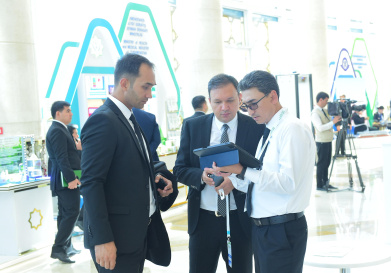Climate Investments: Key to a Sustainable Future for Central Asia
19.09.2025 | 17:35 |Avaza, September 19 | ORIENT. In line with the global Sustainable Development Goals, a separate session of the Turkmenistan Investment Forum was devoted to the importance of environmentally friendly investments and the creation of infrastructure capable of withstanding the effects of climate change. Leading experts from the World Bank, UNDP, UNEP, and the EBRD, as well as representatives of ministries from Turkmenistan and other countries, facilitated a high-level discussion. The session was moderated by World Bank Regional Director for Central Asia Nadji Benhassine.
A Regional Response to a Global Challenge
Delegates were particularly interested in the presentation by Charymuhammet Shallyev, Director of the CAREC Institute (Central Asia Regional Economic Cooperation Program). He emphasized that climate change is already having a significant impact on the Central Asian economy. In response to these challenges, the region adopted the CAREC Climate Change Vision, which aims to reduce carbon emissions by 15–60% by 2030.

The CAREC Action Plan for 2025–2027 identifies specific areas:
Institutional development. Strengthening the water-energy-food nexus.
Low-carbon growth. Promoting renewable energy and clean transport.
Sustainable infrastructure. Ensuring the protection of transport corridors, energy, and water systems from climate risks.
Digitalization. Implementing monitoring and early warning systems.
To achieve these goals, the CAREC Institute encourages countries to actively promote green investment and develop environmental education.
A Successful Case Study: Morocco's Experience
A keynote address by Ahmed Khalid Benomar, Senior Advisor to the Minister of Economy and Finance of the Kingdom of Morocco, provided a valuable insight into the discussion. He shared his country's experience of viewing climate change not simply as an environmental threat, but as a structural challenge.

According to Benomar, Morocco has successfully implemented a concept based on energy sovereignty over the past 20 years. The country strives to reduce its dependence on global markets by focusing on renewable energy sources. The speaker highlighted key achievements.
• Energy Transition: By 2024, the share of renewable energy in the country's energy mix reached 45%, with an ambitious goal of 56% by 2027.
• Megaprojects: Large-scale solar and wind energy projects (such as the Noor complex) have been implemented, as well as pilot projects for the production of green hydrogen, with a planned investment of $32 billion.
• Infrastructure Development: Morocco is investing in modern transportation hubs (Africa's first high-speed train, the Tangier-Med port) and strengthening its role as a transport bridge between continents.

The session demonstrated that climate and sustainable infrastructure issues extend far beyond the environmental agenda, becoming a key element of economic and investment strategies. Morocco's example clearly demonstrated how an ambitious transition to a green economy can not only mitigate risks but also open up new opportunities for growth and strengthening the country's global role. The dialogue confirmed Central Asia's readiness to systemically address climate challenges, drawing on best global practices.











